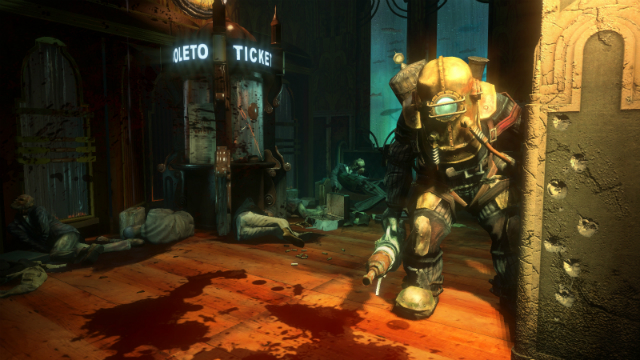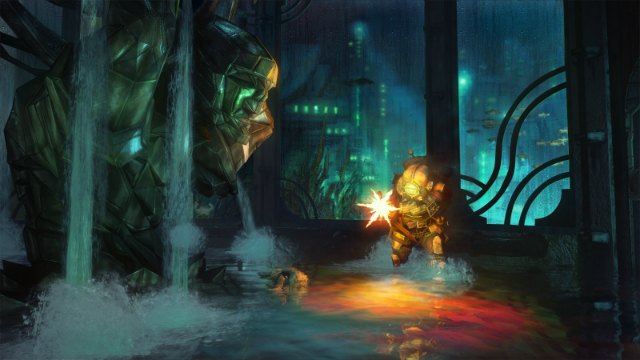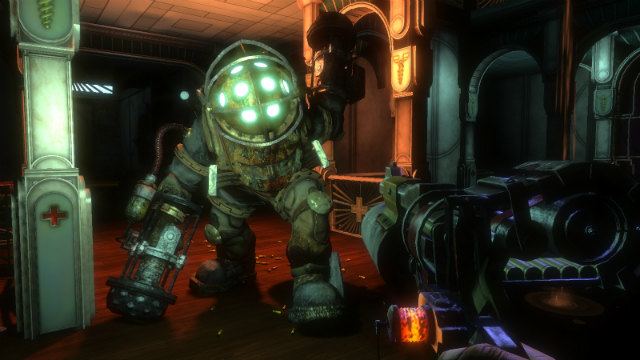Hall of Fame: BioShock
 Usually a game has to have been out for quite a while before anyone would think of inducting it into any kind of Hall of Fame, but, with the case of this month’s Hall of Fame entry, that period of time simply isn’t required. It was an instant classic from the moment it was released back in 2007, the way it intertwined the storytelling with the gameplay and left us all wanting more, the way it introduced us to a new environment, new people and new technology, keeping us all entertained along the way is purely masterful. This month’s Hall of Fame entry is the fantastic BioShock.
Usually a game has to have been out for quite a while before anyone would think of inducting it into any kind of Hall of Fame, but, with the case of this month’s Hall of Fame entry, that period of time simply isn’t required. It was an instant classic from the moment it was released back in 2007, the way it intertwined the storytelling with the gameplay and left us all wanting more, the way it introduced us to a new environment, new people and new technology, keeping us all entertained along the way is purely masterful. This month’s Hall of Fame entry is the fantastic BioShock.
Tarak talks about his expectations for BioShock, or lack thereof, as well as the atmosphere of the game.
Tarak Ford: I was 16 years old when I picked up BioShock, having heard very little about it, I went in without any real expectations. I wasn’t buying a critically acclaimed masterpiece, the spiritual successor to System Shock or Irrational’s first game since joining 2K. I was simply getting another FPS, just a game to play over the weekend. However it didn’t take long before I released BioShock was in fact something incredibly special.

More than just an FPS, BioShock managed to create a world that would stick with the player long after the game had finished. The opening sequence is something I’ll never forget, finding myself floating in the middle of the ocean after a plane crash, I was quickly on my way down to Rapture in the Bathysphere. The game does a brilliant job of setting the scene as you descend into the depths, and from that point on the pacing is flawless. Characters and events reveal themselves in such an organic way, the sense of adventure and discovery you feel is far grander than the tight claustrophobic walls of Rapture should allow.
Although the first part of the game is difficult, as you progress BioShock loses much of its challenge, at least from a purely gameplay perspective. Despite being fully equipped to deal with the demonic splicers and even a Big Daddy, the game is so incredibly well designed I still found myself creeping round each corner, jumping at every sound. The atmosphere in BioShock created by the beautiful visuals, audio and writing is something I have yet to see matched in a video game or any other genre for that matter.
Robin gives us an insight into how BioShock changed his opinion of scary games.
Robin Parker: I’m normally not one for scary games, not just horror titles, I used to steer away from anything that is likely to make you jump out of your seat. BioShock changed all that for me. Due to the great storyline and rewarding gameplay experience found, I am now willing to give scary games the benefit of the doubt (at least to begin with anyway). The main thing that will instantly grab you about the game is its unique and beautiful setting. The underwater utopia gone awry that is Rapture is an Art Deco dream, turned into a nightmare through the ravages of time and the effects of gene splicing. You are now stuck here, trying to find a way out and discover what really happened to the underwater city. Right down to the smallest detail, it all screams out retro authenticity, with the gadgets, advertising posters and products all fitting into the theme beautifully.

Of course it is the gene-splicing, Big Daddy fighting action that takes centre stage. Carried over from the popular System Shock games, the team revels in the idea of upgrading your physical abilities in order to create a super weapon, where you can combine special powers and weapons, quickly and effectively in order to most efficiently destroy your enemies. The fact that you have to harvest Adam to upgrade these powers, and therefore have the moral dilemma of whether or not you should kill the little sisters and take the easy, super-powered route, or save them and have more of a grinding, challenging experience, adds an extra layer of immersion to the proceedings. The fact that your choices will come back and have an effect at the end of the game is just reward for such an interesting game mechanic. Then of course there are the lumbering, menacing Big Daddies, who became so iconic, and only add to the horrible feeling of being trapped in this world, surrounded by maniacs. It is this feeling of isolation and fighting against the odds which runs through the whole game, and the main plot twist emphasises this further, as you fight for your life against ever-increasing odds, to escape.
Martin goes into why BioShock is such an important game to him.
Martin Baker: When it comes to video games, and the ones that I absolutely adore, there’s nothing more important to me than the story. It’s what brings people into the game, it’s what makes them fall in love with the world that the game is surrounding and, at the end of the day, is the biggest reason why a lot of people will choose to come back to a game. Get the story wrong and you can almost guarantee that the game will sit on potential players’ shelves and never get played again; if it’s a story driven game of course.
Over the past couple of years, maybe even the last decade (God, I feel old), there have been very few games that have captured that hearts and imaginations of the players more than the BioShock series. The first time we came across the vast underwater city of Rapture, after the plane crash in the very first game, many people will have been marvelled by what they saw before them. It starts out looking like the city that we all wished we lived in, with a leader who clearly knew what was the best course of action for the people he was striving to protect, Andrew Ryan. What could go wrong? Oh…yeah…everything.

It’s not long before you start to realise that everything isn’t as perfect as it apparently once was, but that was a long time ago. Now you’re trapped, the splicers aren’t going to let you out without a fight and you’ve got to figure out exactly what happened down here on the bottom of the ocean. The gameplay wasn’t fantastic, at least in my opinion, I was forever running out of ammunition and scrambling through the trash cans littering each level muttering “if I only had one more clip!”, but I pressed on because I loved the story, I loved the aesthetic of the game and I absolutely adored Rapture. How could such a perfect specimen of human architecture go so wrong? And so quickly? I needed to know that answer, so I continued to play, not because I wanted to (there were certain moments that I actively didn’t want to play), but I needed to get to the end of the story.
BioShock deserves to be on the list of Hall of Fame entries for that reason alone. Story. Not many games have comes close to that level of storytelling since the first BioShock game and, when one inevitably does, I’ll play that too. Even if it is just for the story.
Lee talks about how it took him three attemps to complete BioShock, and why.
Lee Garbutt: It took me a long, long time to appreciate BioShock. I have purchased the game on three separate occasions for Xbox 360, the first two times ending up as quick trade-ins for other titles, as the game failed to resonate with me.
But it was on my third attempt last October (funnily enough I finished Bioshock the day I started posting for GodisaGeek) where everything slotted together for me; the rich, claustrophic setting of Rapture, the constant fear of ambush by Splicers and the brilliant use of audio to convey narrative (and atmosphere).

There’s one moment that still sticks in my mind today: As I was inspecting a room for ammo and items, I came accross a table, which I looted of all it’s goodies. I turned around to find a Splicer right in front of me, screeching in front of my face.
While I wouldn’t say it was up there with the best games I’ve played, BioShock is a triumph of atmosphere and narrative that everyone should play through (and finish).
The GodisaGeek Hall of Fame will return next month!




